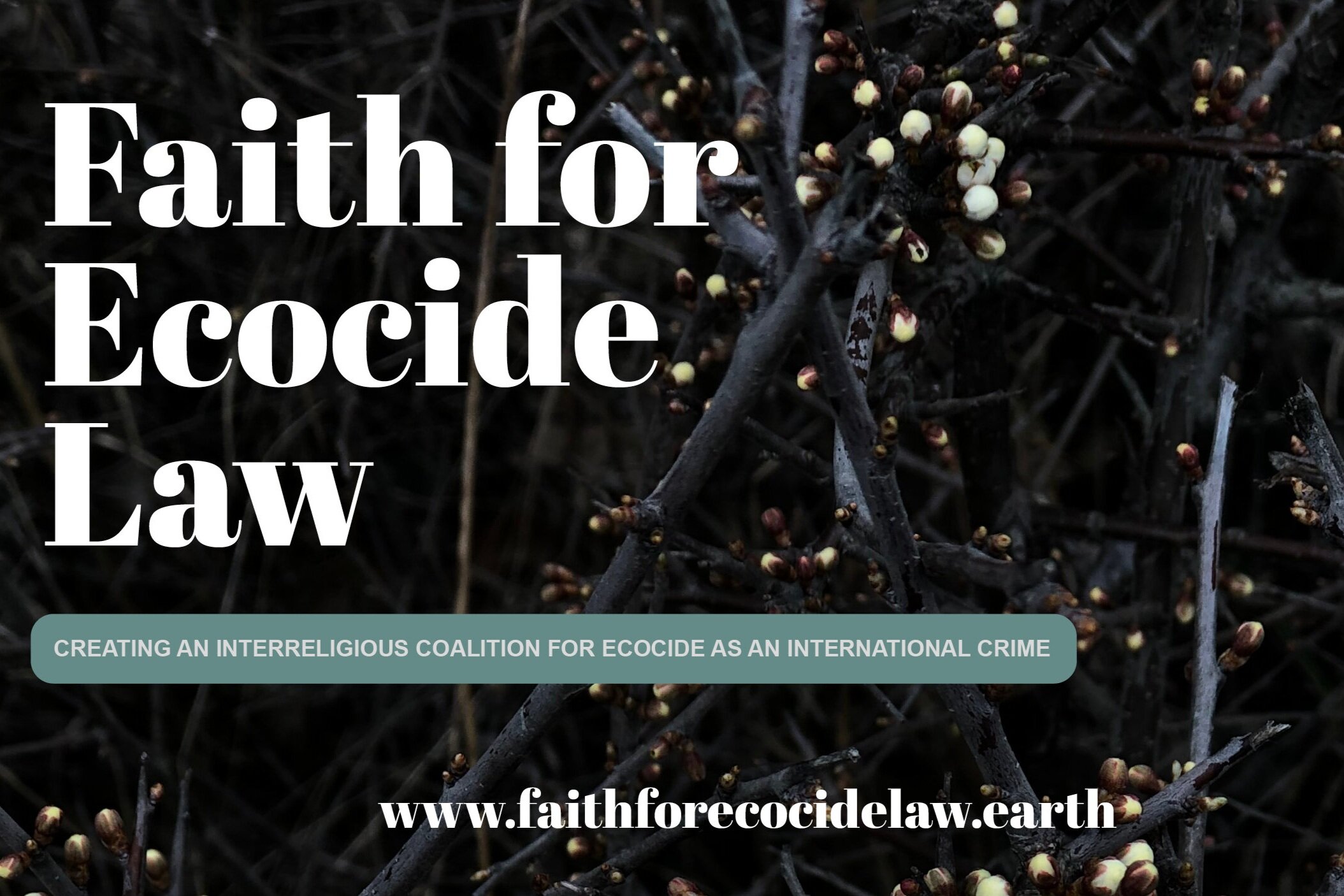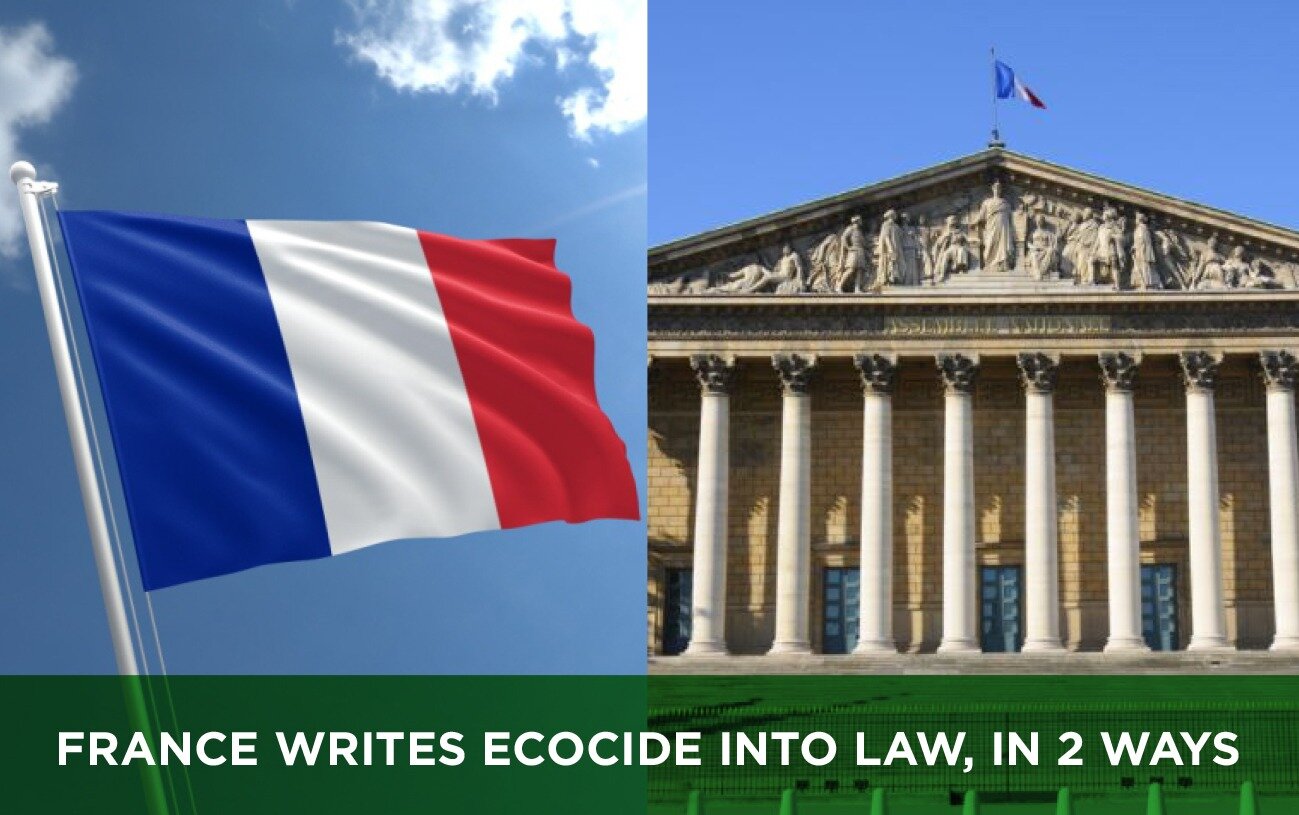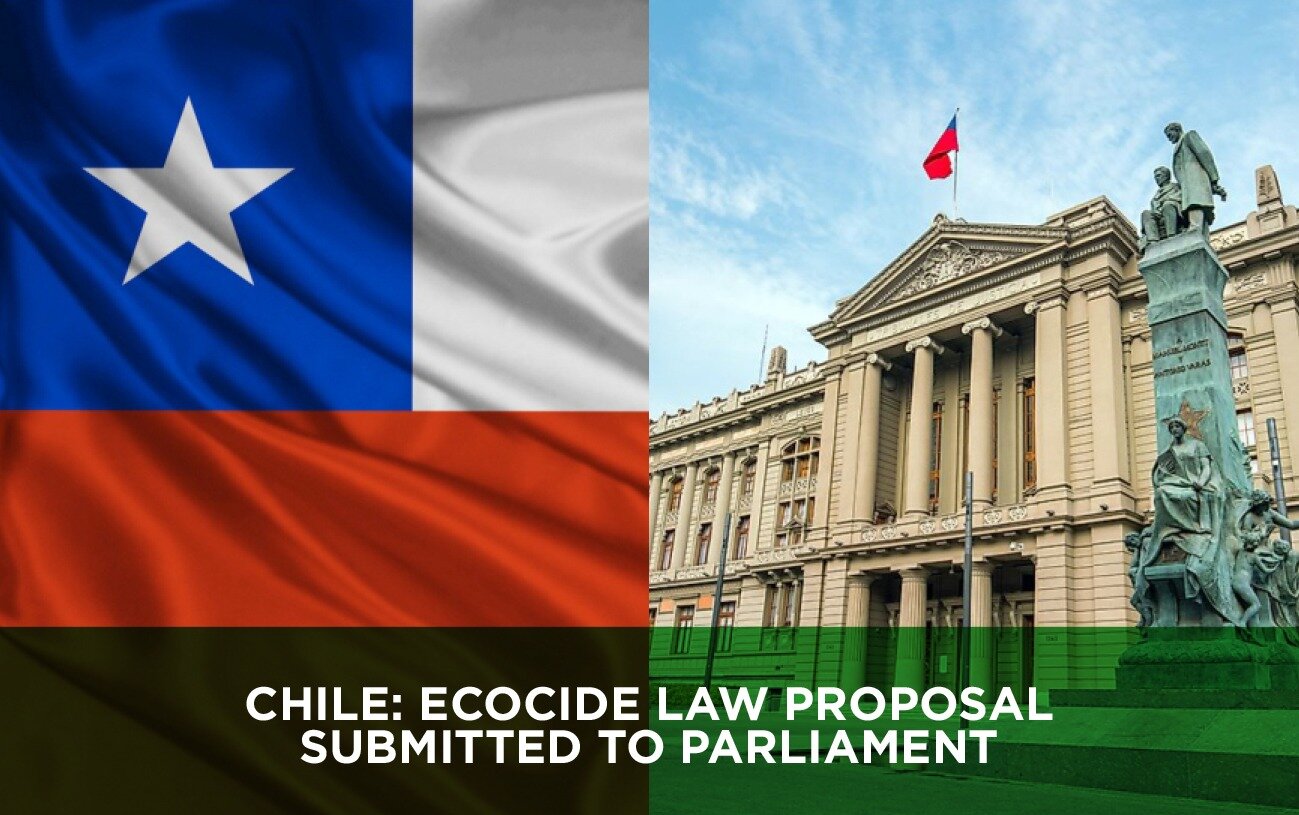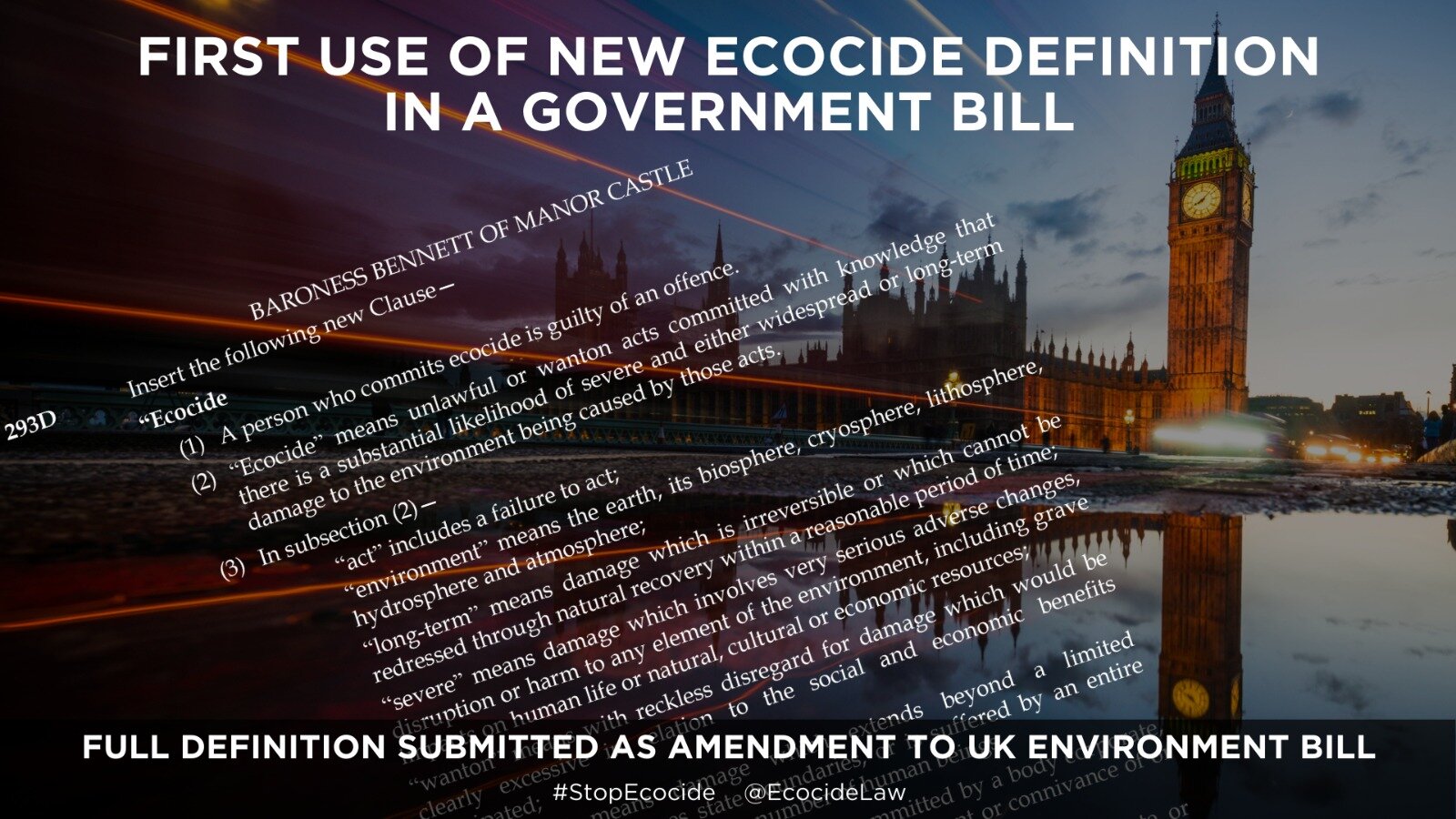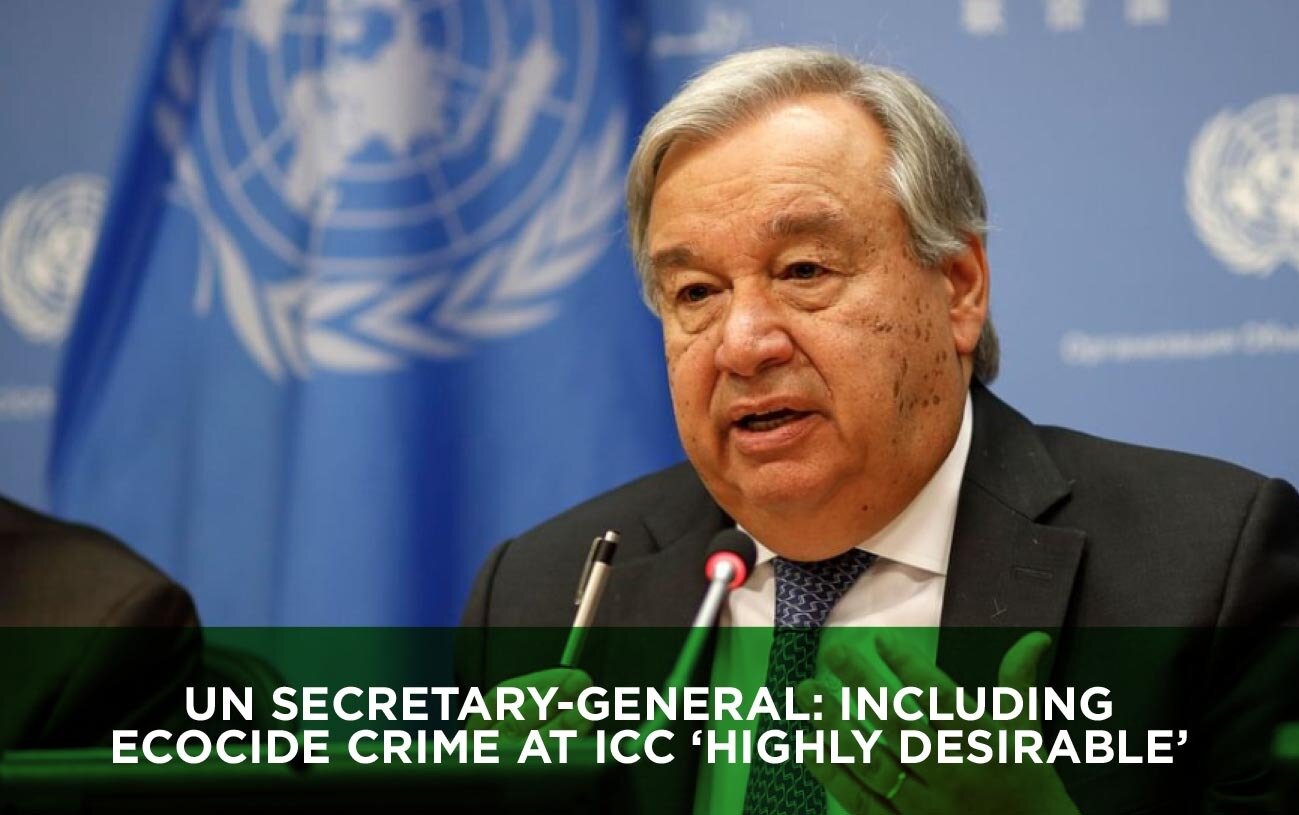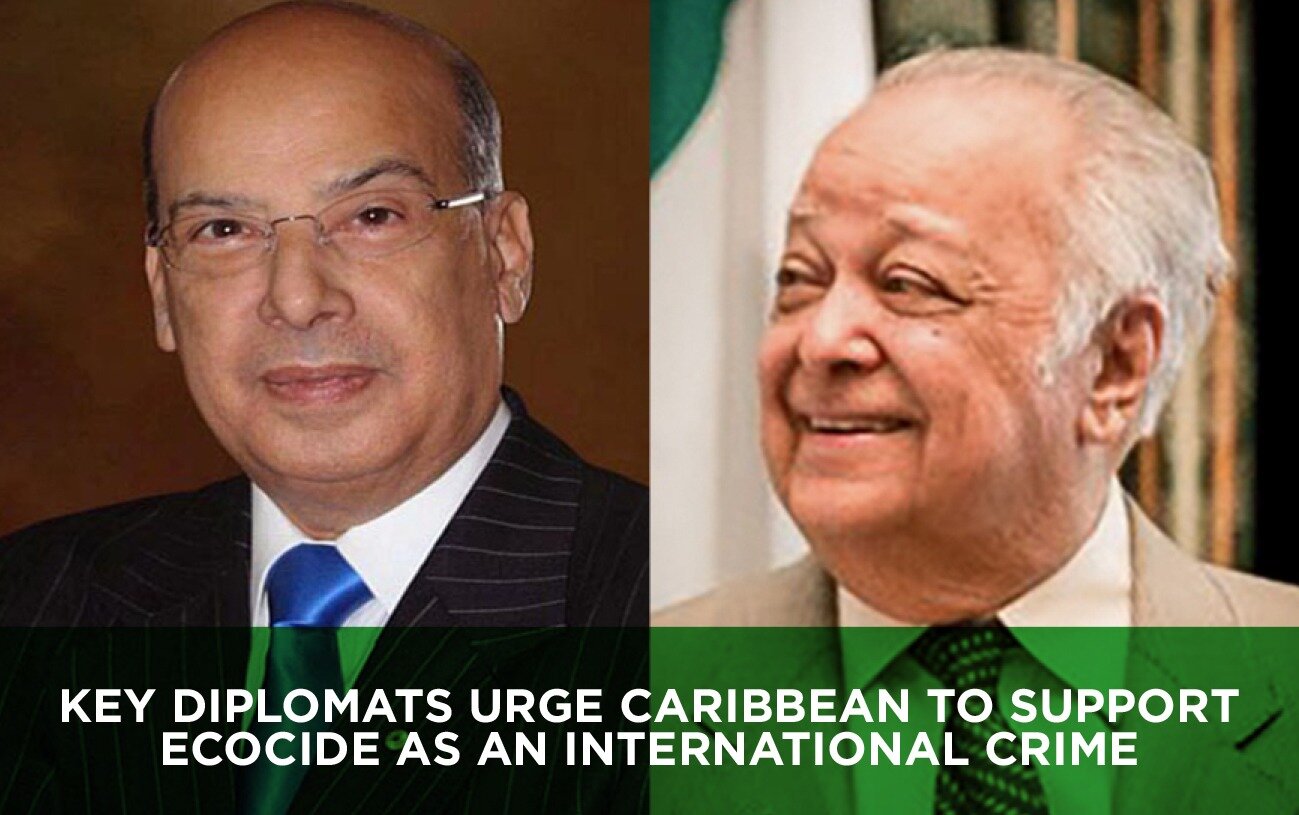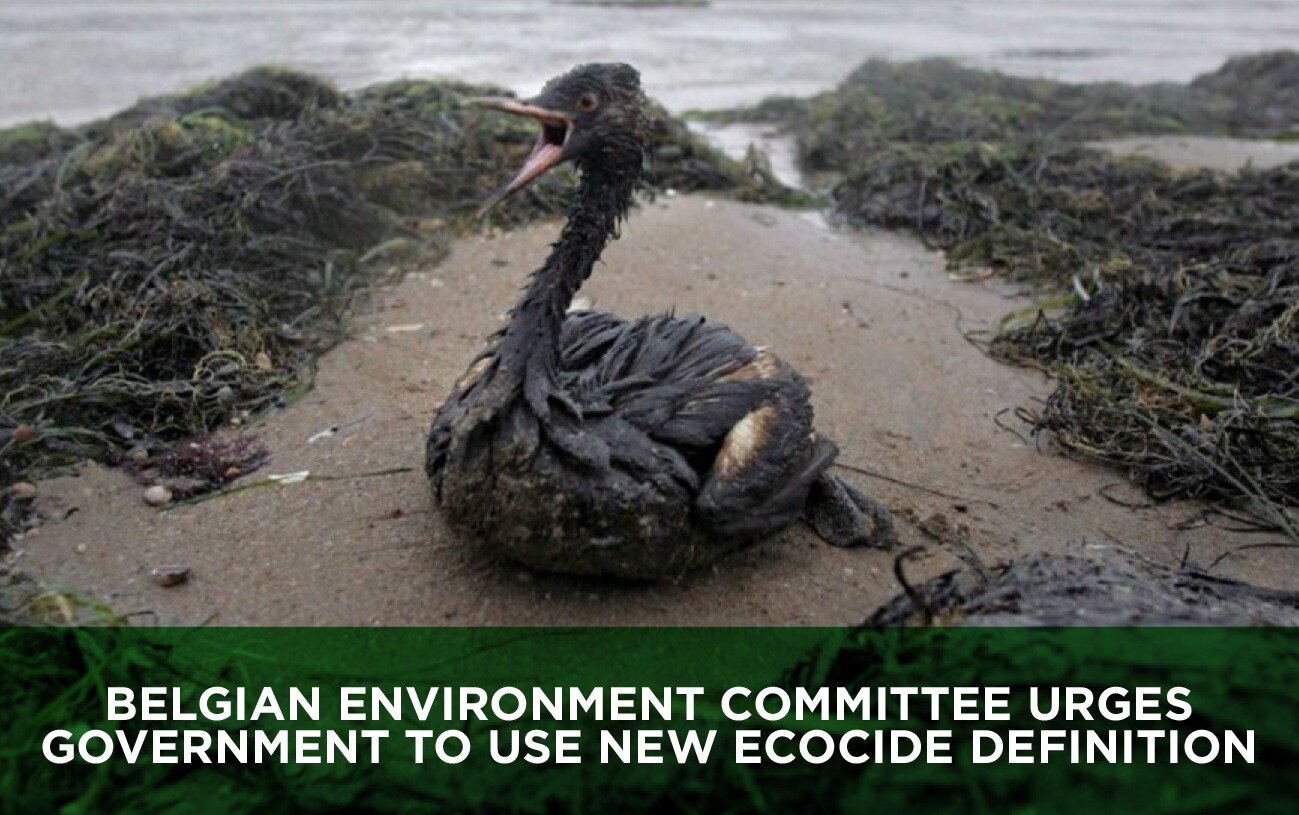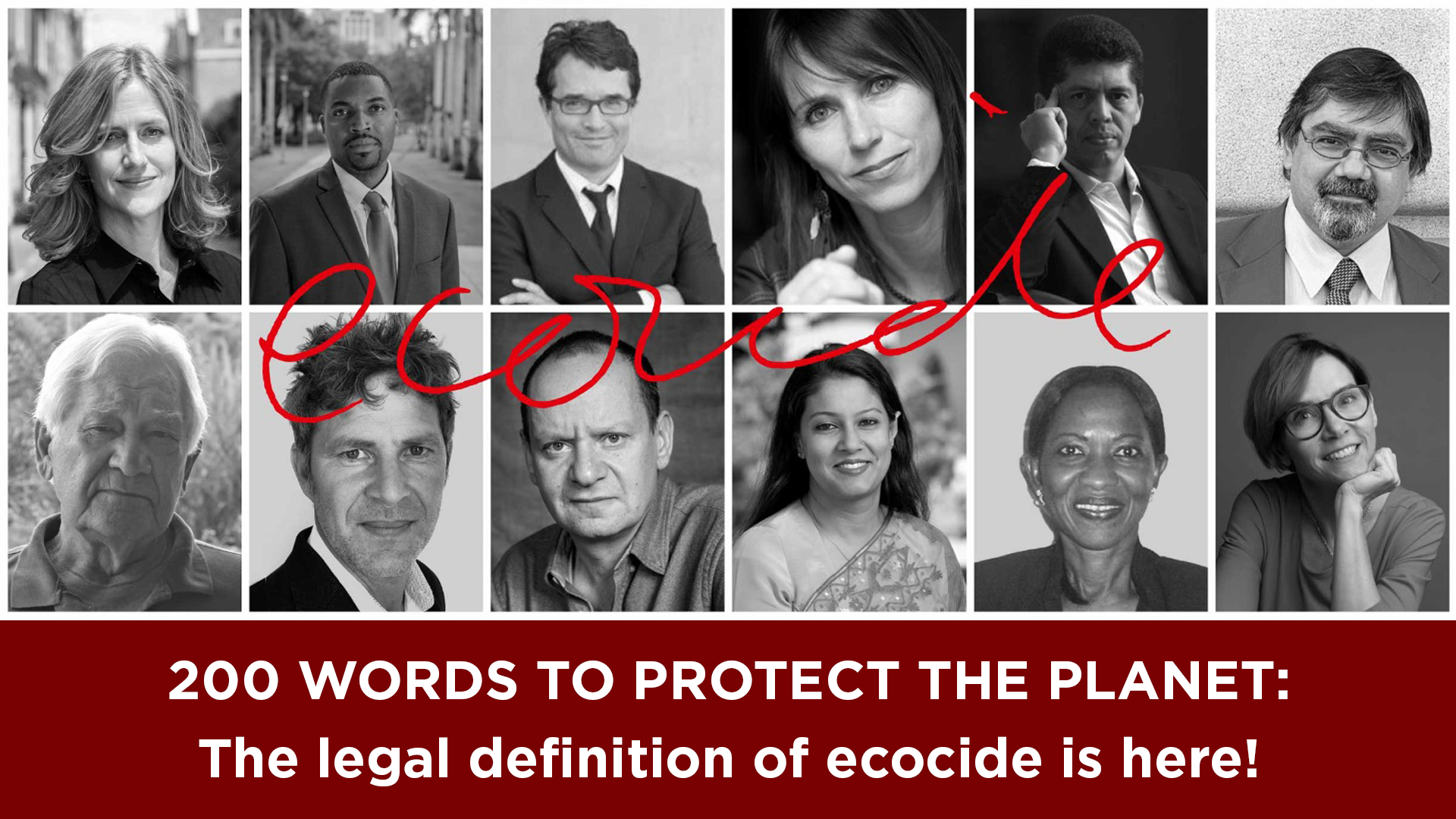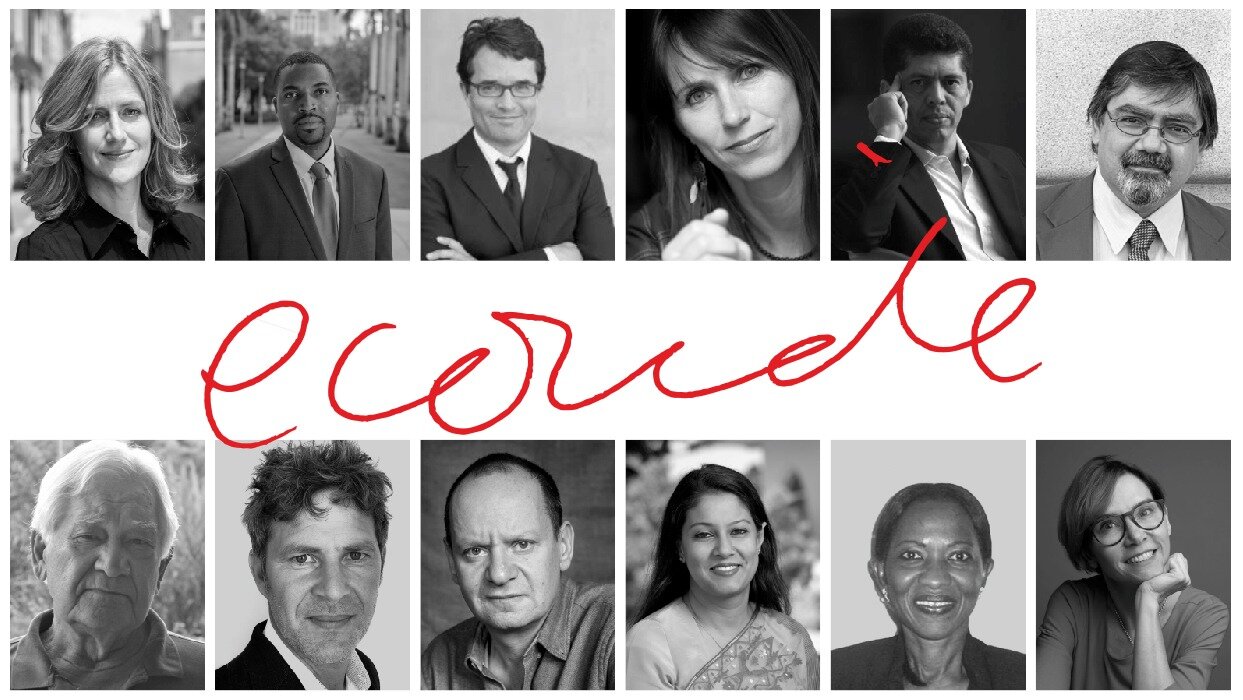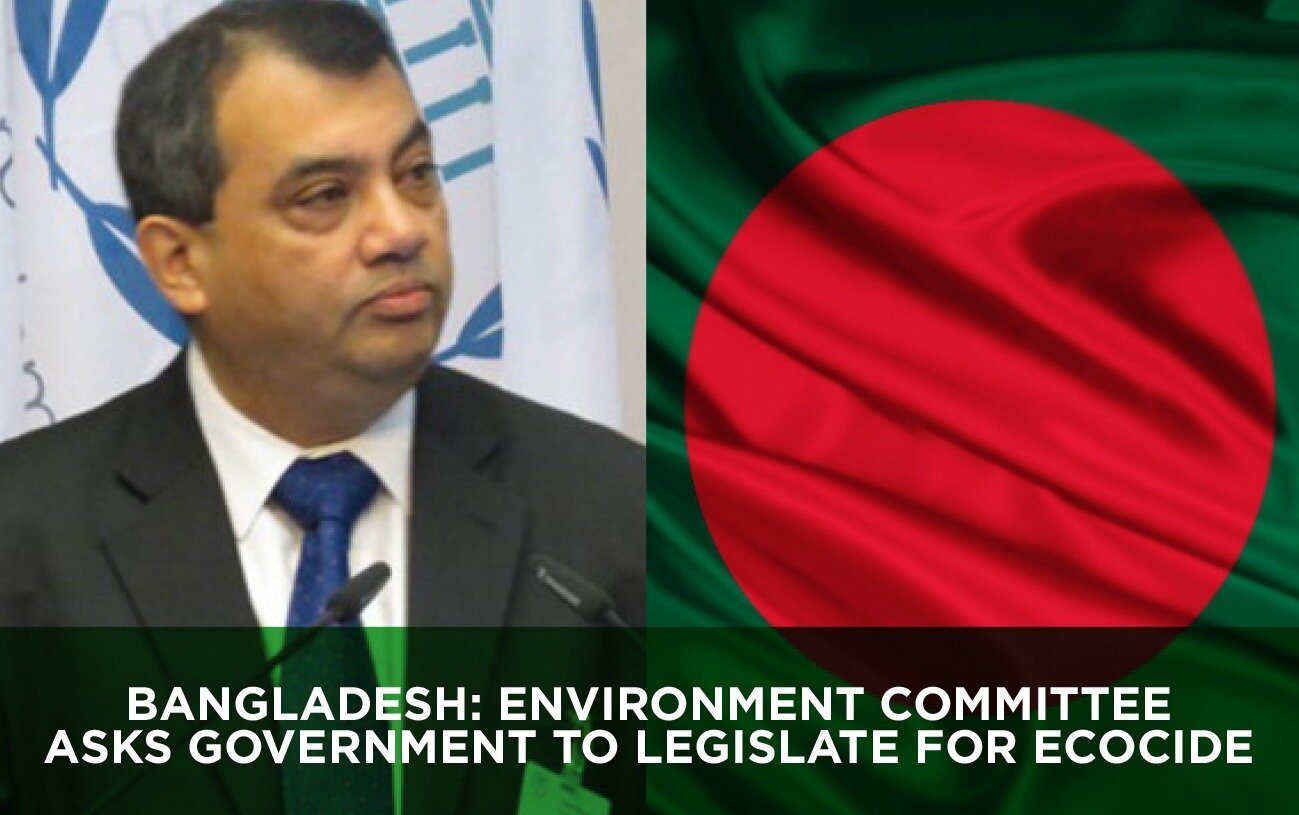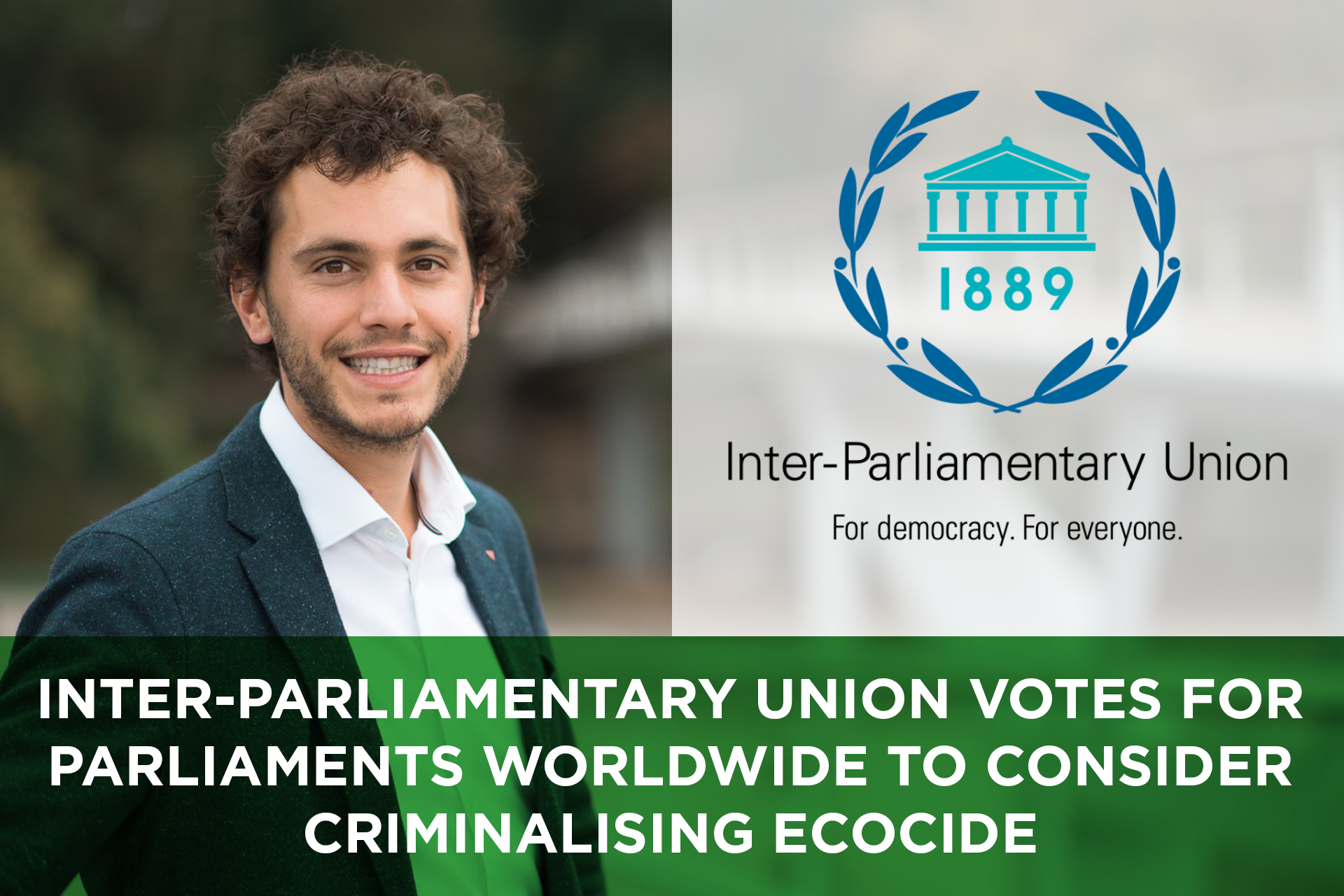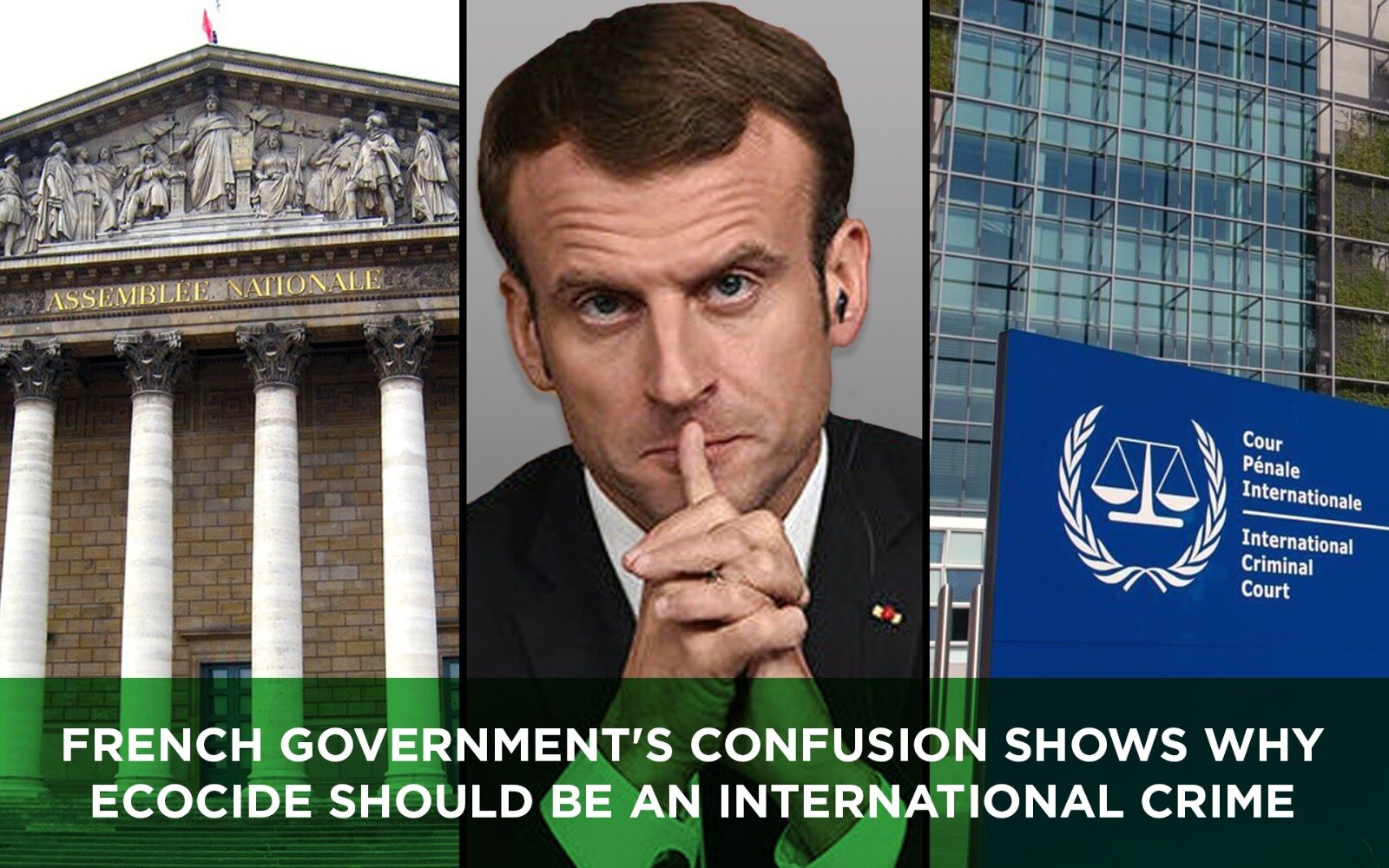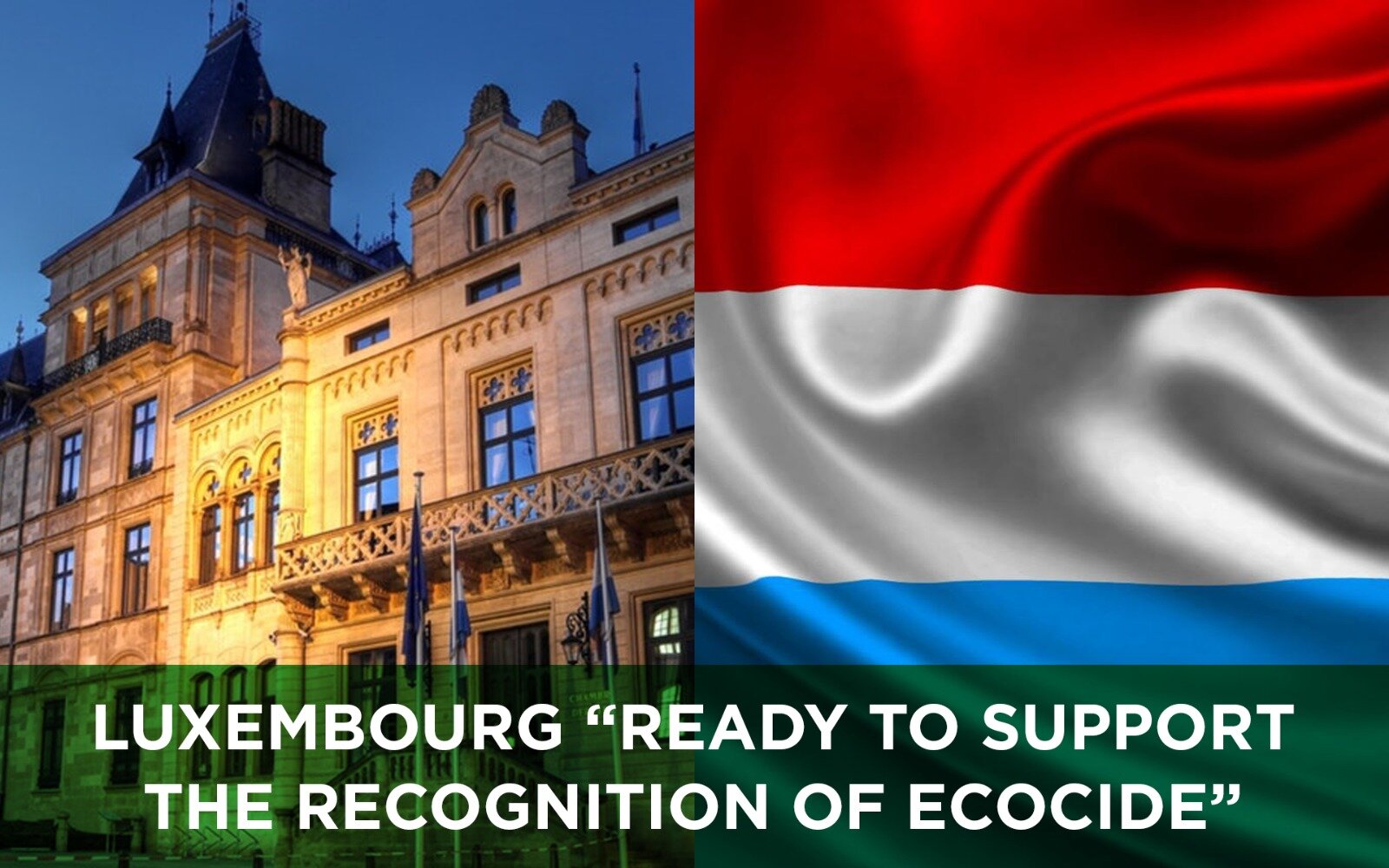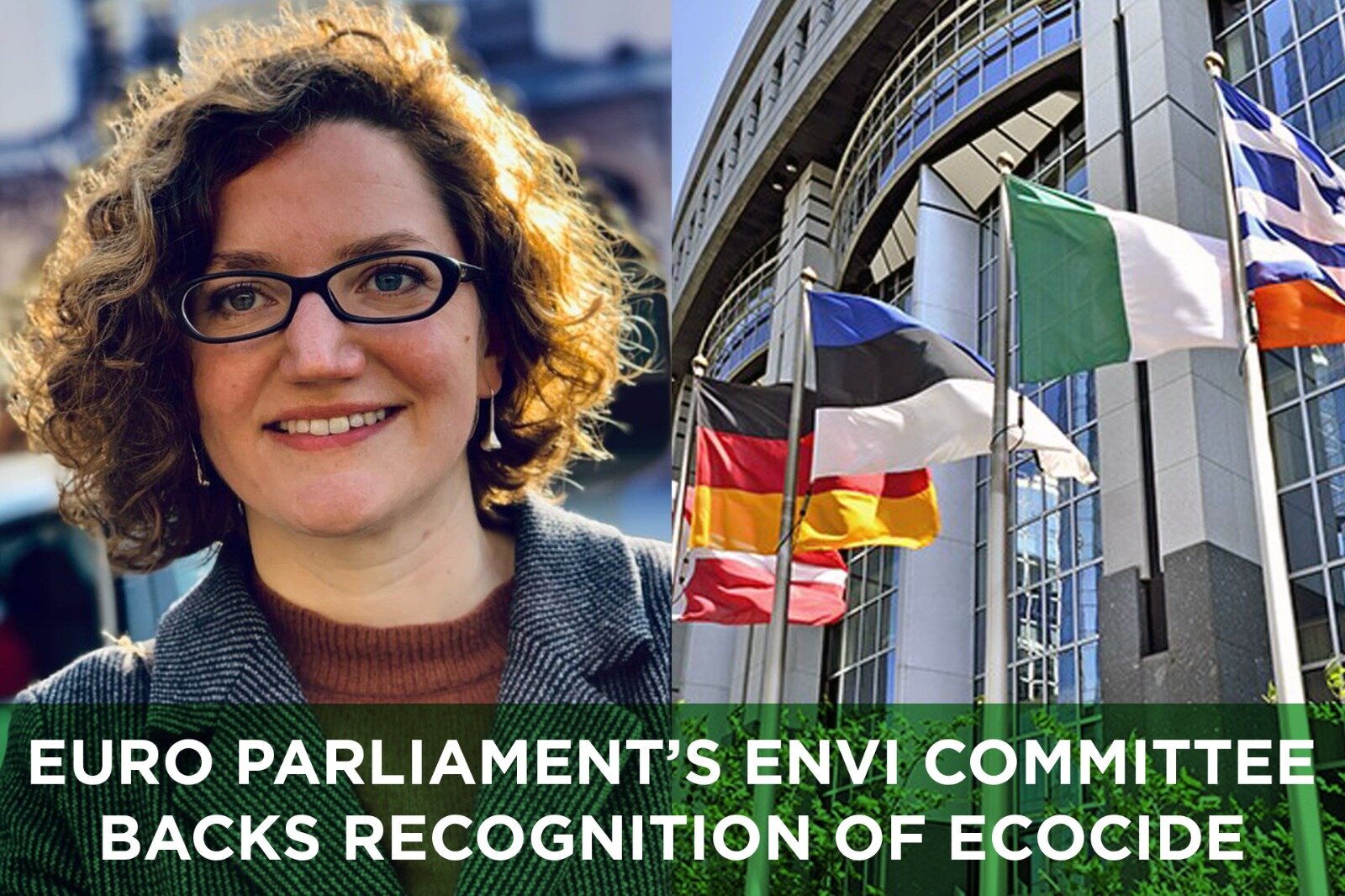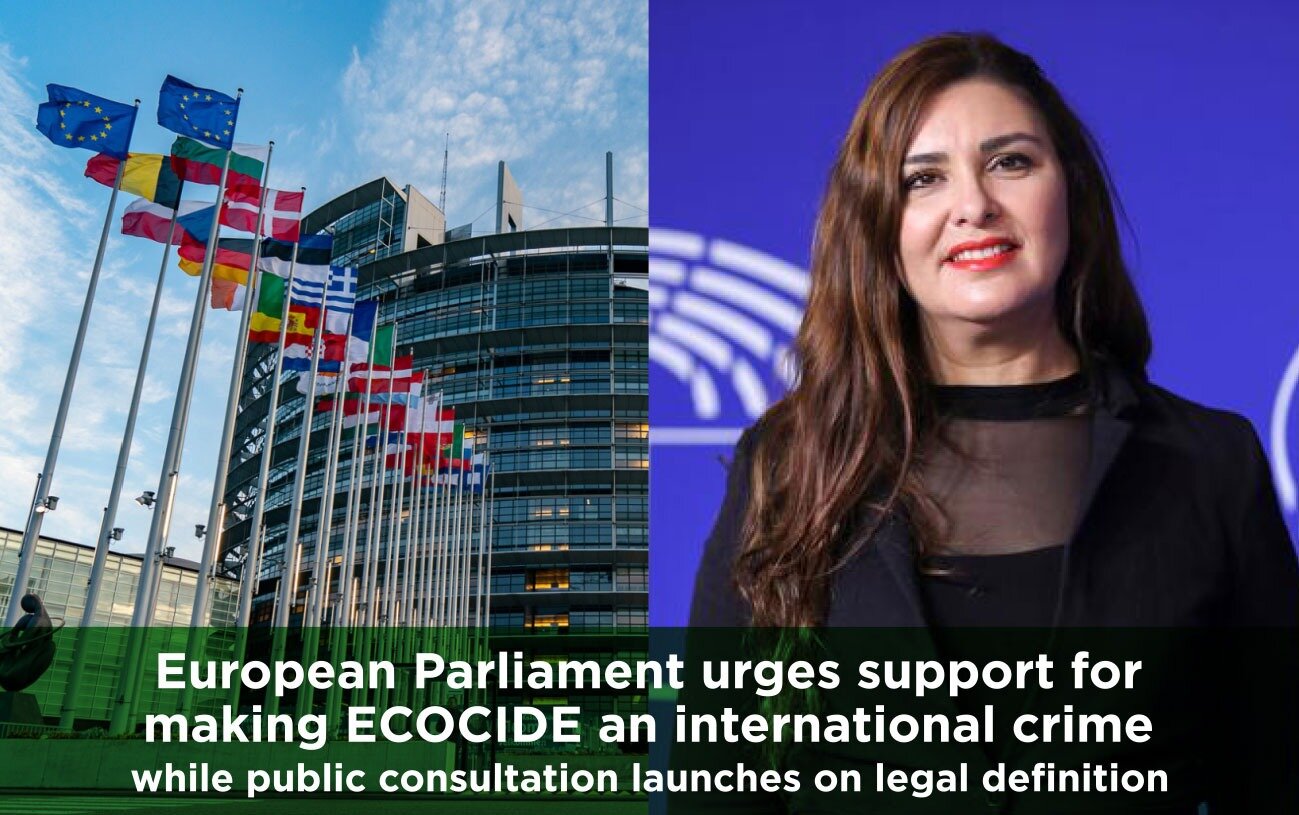Gathering faith communities in support of an international crime of ecocide
Faith for Ecocide Law launches September 16 2021
Faith for Ecocide Law launches September 16
Faith for Ecocide Law is an interfaith coalition in support of an international crime of Ecocide at the International criminal court. It is a joint initiative from End Ecocide Sweden, Stop Ecocide International, the Swedish Christian Council and the Stockholm Catholic Diocese with partners.
At the first UN conference on environmental issues, the Stockholm conference in 1972, Swedish Prime minister Olof Palme used the term Ecocide. Almost half a century and many treaties and conventions later, the living systems of the world are rapidly being degraded. Faith for Ecocide Law will strengthen support for an international crime of ecocide in the run up to the next UN conference for sustainable development, Stockholm+50. The initiative launches at a global online conference on September 16 with speakers from different faiths and interfaith organizations.
“Ecocide as an international crime is absolutely necessary in the transition to a sustainable society, and we believe it must be on the agenda of the Stockholm+50 conference”, says Pella Thiel, Chair of End Ecocide Sweden. “Faith communities contribute with an important voice. Most people in the world have a faith and regardless of how we know God, I think we all agree that Nature,as our earthly home, needs to be respected.”
The faith communities of the world have been increasingly vocal about the need to protect nature. Pope Francis has proposed that “sins against ecology” be added to the teachings of the Catholic Church and said that “ecocide” should be a fifth category of crimes against peace at the international level crime. Anders Arborelius, bishop of the Catholic Diocese of Stockholm and Cardinal in the Catholic church, is one of the speakers at the launch. He says referring to ecocide legislation would be of great support to him.
“As Catholic Christians, we all have a responsibility to ensure that God's creation is cherished and revered and not destroyed and degraded. Therefore, it should also be a matter of course that at the international level one can arrive at a binding legislation that makes Ecocide impossible.”
At its annual Assembly meeting in August 2021, the Church of Sweden Youth decided to support the recognition of ecocide as an international crime and urges the Church of Sweden to do the same.
“It feels great that we are now officially behind the demand to recognize ecocide as an international crime”, says Hanna Soldal, Coordinator of Global advocacy and Youth participation at the Church of Sweden Youth. “For the sake of nature, but also for all people who depend on it; today and in the future. We believe that this is precisely the type of initiative that can give us humans hope and strength to continue to fight for a healed creation.”
Launch event:
Interfaith call for Ecocide Law, online conference,
September 16, 9-12 CET
Press conference at IUCN challenging rejection of stop ecocide motion
Stop Ecocide International (SEI) calls press conference at IUCN World Congress following unprecedented use of IUCN rule to challenge it's rejection of SEI motion
Stop Ecocide International (SEI) calls press conference at IUCN World Congress following unprecedented use of IUCN rule to challenge it's rejection of SEI motion
Stop Ecocide International today held a press conference at the IUCN World Congress, having made unprecedented use of a IUCN rule to challenge rejection of a motion supporting an international crime of ecocide.
The motion, led by Stop Ecocide International, urged the IUCN Assembly to encourage member states which are parties to the Rome Statute to consider the new legal definition of ecocide and treat it as a springboard for serious discussion on amending the Rome Statute of the International Criminal Court.
The establishment of a crime of ecocide would support everything the IUCN does and stands for. Yet, the IUCN stated that the motion was neither new, nor urgent, thus missing a historic opportunity to place themselves on the right side of history, and to stand for the strong protection of ecosystems in law, in solidarity with future generations of all species.
Stop Ecocide International is now calling publicly on all IUCN member organisations to keep a close eye on the progress of advancing an international crime of ecocide. We know the conversation is only going to get louder.
Watch press conference highlights:
** Co-sponsors supporting this appeal ***
Born Free Foundation (Mark Jones) - UK
Both Ends (Natalie van Haren) - The Netherlands
Center for Biological Diversity (Tanya Sanerib) - USA
Center for Environmental Legal Studies, PACE University (Smita Narula) - USA
Environmental Law Program at the William S. Richardson School of Law (David Forman) - USA
ERuDeF (Louis Nkembi) - Cameroon
Gallifrey Foundation (Antoinette Vermilye) - Switzerland
Natural Resources Defense Council (Paul Todd) - USA
Synchronicity Earth (Jessica Sweidan) - UK
Sylvia Earle Alliance / DBA Mission Blue (Deb Castellana) - USA
Vereniging Milieudefensie / Friends of the Earth Netherlands (Donald Pols) - Netherlands
Mulanje Mountain Conservation Trust (Raheela Ahmed) - Malawi
France writes ecocide into law, in 2 ways
France’s Climate & Resilience Act, passed this week, includes ecocide in not one, but two contexts.
France’s Climate & Resilience Act, passed this week, includes ecocide in not one, but two contexts.
Firstly, as a “délit” under national law (Article 231-3), providing for up to 10 years in jail for those committing offences which “cause serious and lasting damage to health, flora, fauna or the quality of the air, soil or water.” Not perhaps the full scope envisaged by the Citizens’ Climate Assembly which aimed for a stricter categorisation of ecocide as a “crime”, but an offence with serious penalties nonetheless.
Secondly, the government is obliged, under Article 296 of the new law, to report back to parliament within one year on “its action in favour of the recognition of ecocide as a crime which can be tried by international criminal courts.”
Chile: ecocide law proposal submitted to parliament
Chilean parliamentarians launch bill consisting of an amendment to the Chilean penal code to introduce a new crime of ecocide which is directly based on the new definition.
Following a recent resolution passed in the Chilean parliament urging the government to support the recently emerged legal definition of ecocide, a group of Chilean parliamentarians has now launched a corresponding legislative initiative proposing a new law.
This bill consists of an amendment to the Chilean penal code to introduce a new crime of ecocide which is directly based on the new definition.
1st use of new ecocide defintion in a government bill
An amendment has been submitted by Baroness (Natalie) Bennett of Manor Castle to the UK Environment Bill using the full definition elaborated by the Independent Expert Panel for the Legal Definition of Ecocide convened by our Foundation. This is the first use on record of the full definition in a government bill.
Full definition submitted as amendment to UK Environment Bill
An amendment has been submitted by Baroness (Natalie) Bennett of Manor Castle to the UK Environment Bill using the full definition elaborated by the Independent Expert Panel for the Legal Definition of Ecocide convened by our Foundation. This is the first use on record of the full definition in a government bill.
The amendment follows another submitted by Baroness Bennett last month requiring the government to negotiate the addition of Ecocide to the list of international crimes under the jurisdiction of the International Criminal Court (currently Genocide, Crimes Against Humanity, War Crimes and the Crime of Aggression). This second amendment calls additionally for a UK crime of ecocide using the full recently launched definition.
Both of Baroness Bennett’s amendments on ecocide can be viewed HERE - see page 79 (amendment 287 - support for an international crime) and 85 (amendment 293D - the full definition, as a UK crime).
The subject is scheduled to be discussed in the House of Lords (the UK’s upper chamber) in July, just before the parliamentary recess. If the amendment is passed by both Houses, the UK government will be the first to adopt the definition.
With the UNFCCC’s COP26 climate talks to be hosted in Glasgow in November, the spotlight is on the UK to lead on addressing the climate and ecological crises - which, as the latest IPCC/IPBES report makes clear, must be addressed together.
Legislating for ecocide would show clear, appropriate and decisive leadership, setting an example for the international community to step up alongside.
UN Secretary-General: including ecocide crime at ICC ‘highly desirable’
UN Secretary-General Antonio Guterres has voiced his support for an international crime of ecocide.
UN Secretary-General Antonio Guterres has voiced his support for an international crime of ecocide. When queried by a journalist from major Spanish broadcaster EFE as to whether he thought that including ecocide as a crime at the International Criminal Court would be desirable, his response was emphatic: “Highly desirable!” he replied.
Guterres described the world as standing “on the verge of the abyss” as he urged immediate climate action. He went on to say “we must mobilise all governments, all companies, all banks, all non-governmental organisations, society as a whole” to understand this. “This is a moment of truth.”
Key diplomats urge Caribbean to support ecocide as an international crime
Antigua & Barbuda’s Ambassador to the US Sir Ronald Sanders and Sir Shridath Rampal, international lawyer and former Secretary-General of the Commonwealth, welcome the legal definition of ecocide.
Antigua & Barbuda’s Ambassador to the US Sir Ronald Sanders has welcomed the recently completed legal definition of ecocide as “heartening news”. He stated it “would open the door for criminal prosecutions against entities that cause ecological damage” such as oil spills, or nuclear accidents to which he notes “the Caribbean has long been exposed.”
Sanders recalled that “it was a Caribbean man, A.N.R Robinson, former prime minister of Trinidad and Tobago who, in 1989, revived the idea of the International Criminal Court (ICC) with jurisdiction over international crimes. He triggered the process that eventually led to the adoption of the Rome Statute – the Court’s founding treaty that came into force in 2002. Large tasks have been taken on by small countries to success when they act together.”
He joins his voice to that of Sir Shridath Rampal, international lawyer and former Secretary-General of the Commonwealth, in welcoming the definition. Rampal, in a recent public statement, urged “serious global support for the work of the Independent Expert Panel for the Legal Definition of Ecocide, organised by the Stop Ecocide Foundation. Their ‘Commentary and Core Text’ of a definition of ‘ecocide’ as an international crime deserve humanity’s urgent attention.”
Sanders’ conclusion was unequivocal: “Every country in the Caribbean should embrace and promote the draft law to make ecocide an international crime. Doing so would give them the support of a further strand of international law which, along with diplomacy, is a principal tool for the defence of their interests.”
Belgian environment committee urges government to use new ecocide definition
The Ecolo-Groen group submits a resolution to the Belgian parliament’s Foreign Affairs committee urging the government to actively support the criminalisation of ecocide
The Ecolo-Groen group submits a resolution to the Belgian parliament’s Foreign Affairs committee urging the government to actively support the criminalisation of ecocide - both at the International Criminal Court and under Belgian law.
The resolution acknowledges the recently launched legal definition of ecocide and suggests the government takes up the definition. It is expected to be discussed in the committee when parliament reconvenes after the summer.
Scotland: cross-party support for ecocide law parliamentary motion
Cross-party support has been gathered for a motion to the Scottish parliament submitted by MSP Monica Lennon welcoming the new definition of ecocide.
Cross-party support has been gathered for a motion to the Scottish parliament submitted by MSP Monica Lennon welcoming the new definition of ecocide from the expert drafting panel convened by the Stop Ecocide Foundation.
The motion also welcomes the growing global support for criminalising ecocide and pays tribute to the pivotal work in this regard of the late Polly Higgins, Scottish barrister and legal pioneer and co-founder with Jojo Mehta of the Stop Ecocide International campaign.
Top international lawyers unveil definition of "ecocide"
Commissioned by the Stop Ecocide Foundation, an expert drafting panel of 12 highly renowned international criminal and environmental lawyers from around the world has just concluded six months of deliberations. The result: a legal definition of “ecocide” as a potential 5th international crime, to sit alongside genocide, crimes against humanity, war crimes and the crime of aggression.
Global expert drafting panel reveals proposal for a fifth crime under the Rome Statute of the International Criminal Court
Commissioned by the Stop Ecocide Foundation, an expert drafting panel of 12 highly renowned international criminal and environmental lawyers from around the world has just concluded six months of deliberations. The result: a legal definition of “ecocide” as a potential 5th international crime, to sit alongside genocide, crimes against humanity, war crimes and the crime of aggression.
The Independent Expert Panel for the Legal Definition of Ecocide, chaired by barrister and author Philippe Sands QC (UK) together with UN jurist and former prosecutor Dior Fall Sow (Senegal), was convened in late 2020 at a powerfully symbolic moment, 75 years after the terms “genocide” and “crimes against humanity” were first used at Nuremberg. The project emerged in response to a request from parliamentarians in the governing parties of Sweden.
The proposed definition will now be made available for states to consider, and will henceforth be visible on the newly launched Ecocide Law website, an academic and legal resource hub co-managed by the Stop Ecocide Foundation and the Promise Institute for Human Rights at UCLA School of Law.
Jojo Mehta, Chair of the Stop Ecocide Foundation and convenor of the panel, said: “This is an historic moment. This expert panel came together in direct response to a growing political appetite for real answers to the climate and ecological crisis. The moment is right - the world is waking up to the danger we are facing if we continue along our current trajectory.”
The drafting work, she explained, “was high-level, collaborative and informed by many experts as well as a public consultation comprising hundreds of legal, economic, political, youth, faith and indigenous perspectives. The resulting definition is well pitched between what needs to be done concretely to protect ecosystems and what will be acceptable to states. It's concise, it’s based on strong legal precedents and it will mesh well with existing laws. Governments will take it seriously, and it offers a workable legal tool corresponding to a real and pressing need in the world.”
Rebecka Le Moine, Member of Swedish Parliament, who initially approached the Stop Ecocide Foundation with a request for a definition of ecocide, said:
“I welcome this definition, as it makes the term ecocide more concrete and clear, it also makes it a lot easier for me as a politician and a lawmaker to find support for criminalization of it.”
Quotes from the panel co-chairs:
Philippe Sands QC, Professor, University College London; barrister, Matrix Chambers; author, East West Street: On the Origins of Genocide and Crimes against Humanity (UK/France/Mauritius):
“It has been a privilege to contribute to this work, inspired by the efforts of Hersch Lauterpacht and Rafael Lemkin in giving the world ‘crimes against humanity' and ‘genocide’, back in 1945. Ecocide is about law in the service of our planet, a means of changing consciousness and of harnessing the idea and ideals of international justice for the greater good.”
Dior Fall Sow, UN jurist and former prosecutor (Senegal):
“This is the beginning of a difficult but exhilarating adventure that should only end with the introduction into the Rome Statute of this fifth crime of ecocide. Let's dare to do it!”
[Additional panelists’ quotes below.]
Support for an ecocide law criminalising mass damage and destruction of ecosystems is gaining momentum around the world with recorded interest from both island nations (Vanuatu and the Maldives) and European states (France, Belgium, Finland, Spain, Luxembourg). It has been endorsed by high-profile figures such as the Pope, Greta Thunberg and Dr Jane Goodall. Belgium is the first European nation to have raised criminalizing ecocide at the International Criminal Court, and the European Parliament has now supported in principle on several occasions.
MEP Marie Toussaint who has made it her mission to progress recognition of ecocide by the EU, is delighted: “After years and years of non-stop mobilisation and struggle all over the world, recognition of ecocide has gained strength and public support. This recognition is essential if we want to protect all life on our planet, as well as peace and human rights.”
She continued: “This highly qualified panel has shown today not only that this is legally feasible, but also that we can have a shared international understanding and definitions. Our role now, as parliamentarians from all over the world, is to work towards legal recognition in every single state along with support for this amendment to the Rome Statute. You can count on me for that! Justice and nature will prevail!”
There is currently no legal framework to deal with ecocide at an international level, and therefore no system to hold corporate and government decision-makers accountable for environmental damages and abuses such as oil spills, mass deforestation, ocean damage or severe pollution of waters. Enshrining ecocide in international law would enable perpetrators to be put on trial at the International Criminal Court or in any ratifying jurisdiction.
You can keep up to date with Stop Ecocide International and the work of the Stop Ecocide Foundation on: Twitter, LinkedIn, Facebook and Instagram.
****ENDS****
Interview requests etc: press@stopecocide.earth
Website: www.stopecocide.earth
Comment (Stop Ecocide): Jojo Mehta +44 7746 395323 (whatsapp) jojo@stopecocide.earth
Notes to Editors
The Stop Ecocide Foundation both advocates for and facilitates steps towards making ecocide a crime at the International Criminal Court (ICC) in order to prevent devastation of nature and so protect the future of life on Earth. It is the only global NGO with this exclusive focus.
The Foundation has an expanding network of communication teams around the globe and websites in multiple languages. A growing number of ICC member states (as well as the Pope and the European Parliament) have publicly expressed interest in an international crime of ecocide.
This progress has been actively facilitated by Stop Ecocide’s campaign narrative alongside strong legal, diplomatic and grassroots collaborations. The work of the Foundation sits at the intersection of these three areas, and is thus uniquely positioned both to support and to amplify the global conversation.
Assets:
Expert panel photographs
Ecocide Law website - just launched: a comprehensive and growing resource hub of academic and legal material, including historical timeline and publications relating to ecocide.
FAQs
Additional panelist quotes:
Deputy Chairs:
Kate Mackintosh, Executive Director, Promise Institute for Human Rights, UCLA School of Law (US/UK):
“This is an exciting moment for us all, as we emerge with a practical definition of ecocide that is both timely and overdue. I believe this legally robust and credible text can take its place alongside the other international crimes, and signal a sea change in our attitudes to the protection and preservation of our planet.”
Richard J Rogers, Partner, Global Diligence; Executive Director, Climate Counsel (UK)
“ ‘Ecocide’ is a criminal law for the 21st Century. If humanity is to reach the 22nd Century with peace and security, we must tame the environmental abuse that has plagued the earth for hundreds of years.”
Panelists:
Valérie Cabanes, International jurist and human rights expert (France):
“We need to broaden the range of the most serious international crimes by recognising a fifth crime against the peace and security of humanity: the crime of ecocide. By destroying the ecosystems on which we depend, we are destroying the foundations of our civilisation and mortgaging the living conditions of all future generations. This is no less serious than war crimes, crimes against humanity, or the crimes of genocide or aggression. As well as being a major issue of global socio-environmental justice, is it not ultimately the survival of the human species that is at stake?
Pablo Fajardo, Environmental lawyer (Ecuador):
“It is imperative to recognize that ecocide is a global threat and needs to be responded to accordingly. We are pleased to be part of this Panel because it has managed to propose a legal formula capable of addressing these types of threats.”
Syeda Rizwana Hasan, Director, Bangladesh Environmental Law Association (Bangladesh):
“We, in the global south, are witnessing massive destruction of natural systems in the name of development, against which national legal systems are not responding adequately. If forests are not protected, emission of greenhouse gases not curtailed and sea level rise not prevented, the next generation will have to draw maps of Bangladesh and other South Asian countries differently. We need recognition of ecocide in international law, to defend Mother Earth, nature and both present and future generations.”
Charles C Jalloh, Professor, Florida International University/UN International Law Commission (Sierra Leone):
“It has been wonderful to work with such a great team of international law scholars and practitioners on this independent expert panel for the definition of a new crime of ecocide. I am pleased that, despite our diverse backgrounds and expertise, we reached a consensus definition. I am hopeful that the outcome will prove useful to States. And that it might even catalyze a much needed amendment to the Rome Statute of the International Criminal Court to finally include ecocide in the list of most serious crimes of concern to the international community as a whole.”
Rodrigo Lledó, Director, Fundación Internacional Baltasar Garzón (Chile/Spain):
“The intellectual generosity of the panel members was truly surprising and motivating, and enabled us to reach a balanced definition. I hope that the States will adopt this definition as their own. It is urgent. Destroying the environment in a massive and irresponsible way must cease to be internationally legal.”
Tuiloma Neroni Slade, Former ICC judge (Samoa):
“The panel's proposals are based on established principles of law and are aimed at strengthening the ability of the ICC to respond to matters of the utmost seriousness to the international community. It has been a special privilege to take part in the work of such a highly committed and distinguished international panel."
Christina Voigt, Professor, University of Oslo (Norway):
“The definition is a tool to which we applied our collective expertise in the conviction that severe destruction of the environment needs to stand on par with other international crimes. It is a tool we can only hope governments will find useful in their future deliberations.”
Alex Whiting, Former International Criminal Court prosecutions coordinator; Professor, Harvard Law School (US):
"Defining the crime is a first step on a path of discussion, debate, and, one day, ratification. The hope is that the process will energize states to think about how to use international criminal law to target the most grave environmental crimes while at the same time deploying domestic criminal and regulatory law to address a broad range of environmental harms that threaten our planet."
The Stop Ecocide Foundation is a registered foundation in the Netherlands with charitable (ANBI) status. Registered address: Nieuwe Herengracht 18, 1018DP, Amsterdam. Postal address: Postbus 601, 1180 AP Amstelveen. Registered foundation number: 76532054.
Bangladesh: environment committee asks government to legislate for ecocide
Bangladeshi parliamentary committee on the Ministry of Environment, Forests and Climate Change recommends adding a provision to the Code of Criminal Procedure or drafting a new legal framework to codify ecocide.
The Bangladeshi parliamentary committee on the Ministry of Environment, Forests and Climate Change has just recommended adding a provision to the Code of Criminal Procedure or drafting a new legal framework to codify ecocide.
The committee's chairman Saber Hossain Chowdhury commented: "Just as genocide is treated as a crime, the destruction of an ecosystem also warrants the same treatment. This is because without an ecosystem, none of us can survive."
Chowdhury is a former president of the Inter-Parliamentary Union which voted almost unanimously in May of this year to support national parliaments considering ecocide legislation.
UK: Ecocide amendment submitted to Environment Bill
Baroness (Natalie) Bennett of Manor Castle, former leader of the UK Green Party, submits an ecocide amendment to the UK Environment Bill. This is the first time a potential crime of ecocide has been recorded in a UK government bill
Baroness (Natalie) Bennett of Manor Castle, former leader of the UK Green Party, has submitted an ecocide amendment to the Environment Bill currently making its way through the House of Lords (the UK’s upper chamber).
This is the first time a potential crime of ecocide has been recorded in a UK government bill, and it is likely to be discussed before Parliament goes into recess for the summer.
The amendment, if passed in both Houses, would have the UK lead on a Rome Statute proposal:
Amendment 287
“International crime of ecocide
(1) It is an objective of Her Majesty’s Government to support the negotiation of an amendment to the Rome Statute of the International Criminal Court to establish a crime of ecocide.
(2) In pursuance of subsection(1), a relevant Minister of the Crown must propose, either independently or jointly with other sovereign states, an amendment to the Rome Statute of the International Criminal Court within 12 months of the passing of this Act.
(3) In this section “ecocide” refers to harm to nature which is severe and widespread or long-term.”
We believe this is a real political opportunity for the UK government.
The context is clear: the UNFCCC’s COP26 climate talks are to be hosted in Glasgow in November and are being touted as a “make-or-break” point for the planet’s future; the latest IPCC/IPBES report makes it clear that climate and ecology crises must be addressed together. Ecocide law can do this.
Supporting an international crime of ecocide would show clear, appropriate and decisive leadership, while at the same time calling on the international community to step up alongside - as of course it must do, if we are to protect our planet’s precious life-support systems and our children’s futures.
Led by Belgium, parliamentarians worldwide support ecocide law
Resolution adopted almost unanimously at global gathering of parliaments.
Samuel Cogolati, chair of the Belgian delegation behind this historic proposal was unequivocal: “It is the first time such a broad international consensus has emerged for the recognition of ecocide as a crime. The tide of political opinion is now with us.”
Resolution adopted almost unanimously at global gathering of parliaments
NEDERLANDS / FRANÇAIS / DEUTSCH / ΕΛΛΗΝΙΚΑ /
Today the Inter-Parliamentary Union (IPU), representing 179 parliaments around the world, adopted a resolution calling on all “IPU Member Parliaments to reinforce criminal law to prevent and punish widespread, long-term and severe damage to the environment, whether caused in peacetime or war, and to examine the possibility of recognizing the crime of ecocide to prevent the threats and conflicts resulting from climate-related disasters and their consequences.” (paragraph 31) All countries supported the ecocide clause except India, Nicaragua and Turkey.
Samuel Cogolati, chair of the Belgian delegation behind this historic proposal was unequivocal: “It is the first time such a broad international consensus has emerged for the recognition of ecocide as a crime. The tide of political opinion is now with us.”
This resolution follows last week’s adoption of two key reports in the European Parliament containing proposals addressing ecocide - one urging members to support an international crime of ecocide and a second calling on the Commission to consider it in EU law.
Barely a year ago, the concept of ecocide was virtually unknown in Belgium, but now the country is a front runner in the growing movement to recognise mass destruction of nature as a serious crime. A parliamentary motion in June 2020, government pledges in September and a strong statement to the International Criminal Court in December have made Belgium a key voice in this fast-growing movement to prevent ecocide through criminal law. With this vote at the Inter-Parliamentary Union, Belgium has taken that advocacy to a global level.
European Parliament votes to take ecocide law seriously
At the European Parliament this week, the movement to criminalize mass damage and destruction of nature or “ecocide” took a surge forward with strongly supportive votes on two key reports.
Two reports adopted this week support criminalization of “ecocide” at EU and international levels
At the European Parliament this week, the movement to criminalize mass damage and destruction of nature or “ecocide” took a surge forward with strongly supportive votes on two key reports.
One was from the Legal Affairs committee on the liability of companies for environmental damage, and urged the European Commission to “study the relevance of ecocide to EU law and EU diplomacy” (para 12) - a significant step, long advocated by MEP Marie Toussaint (Greens/EFA, above right), who co-ordinates the Ecocide Alliance, an international alliance of parliamentarians for the recognition of ecocide. This comes not long after the prestigious European Law Institute approved a project to draft a model ecocide law for potential application in the EU.
“The European Union must keep its promise to be a global leader on justice and protection of the living world,” said Ms Toussaint. “We’ve worked tirelessly to have ecocide discussed and adopted. The moment has come to condemn it as a serious crime.”
She continued: “It may take some time to establish concrete recognition in European law, but we will not let this Parliamentary demand go unnoticed. The European Commission and all European leaders must act - and we will make sure of it.”
Meanwhile, another report from the Foreign Affairs committee on the effects of climate change on human rights and the role of environmental defenders on this matter resolved to encourage “the EU and its Member States to take a bold initiative ... to pave the way within the International Criminal Court (ICC) towards new negotiations between the parties with a view to recognising ‘ecocide’ as an international crime under the Rome Statute” (para 11). This approach to criminalizing ecocide is precisely that pursued by Stop Ecocide International, the global campaign co-founded by Jojo Mehta (above left) and visionary UK barrister the late Polly Higgins.
“It is hugely encouraging to see the European Parliament taking ecocide seriously,” said Mehta. “Politicians around the world are waking up to the fact that we are collectively heading for disaster if we don’t rapidly correct our course. An enforceable deterrent such as criminal law can provide that course correction. A crime of ecocide would create a guardrail for corporate practice, and also empower governments to better enforce existing laws. It’s long overdue.”
Mehta is convenor of the Independent Expert Panel for the Legal Definition of Ecocide, commissioned by the Stop Ecocide Foundation to draft an amendment to the Rome Statute of the International Criminal Court to include a crime of Ecocide. The panel was convened in response to a request from Swedish parliamentarians last year.
Support for an ecocide law criminalising mass damage and destruction of ecosystems is gaining momentum around the world with recorded interest from both island nations (Vanuatu and the Maldives) and European states (France, Belgium, Finland, Spain, Luxembourg). It has been endorsed by high-profile figures such as the Pope, Greta Thunberg and Dr Jane Goodall. Belgium is the first European nation to have raised criminalizing ecocide at the International Criminal Court.
There is currently no legal framework to deal with ecocide at an international level, and therefore no system to hold corporate and government decision-makers accountable for environmental damages and abuses such as oil spills, mass deforestation, ocean damage or severe pollution of waters. Enshrining ecocide in international law would enable perpetrators to be put on trial at the International Criminal Court or in any ratifying jurisdiction.
You can keep up to date with Stop Ecocide International on: Twitter, LinkedIn, Facebook and Instagram. Join the mailing list.
Editor notes:
Stop Ecocide, co-founded in 2017 by barrister and legal pioneer the late Polly Higgins and current Executive Director Jojo Mehta, promotes and facilitates steps towards making ecocide a crime at the International Criminal Court (ICC) in order to prevent devastation of nature and so protect the future of life on Earth. It is the only global NGO with this exclusive focus.
Stop Ecocide International has an expanding network of communication teams around the globe, and websites in multiple languages. A growing number of ICC member states (as well as the Pope and the EU) have publicly expressed interest in an international crime of ecocide.
This progress has been achieved via Stop Ecocide’s campaign narrative alongside strong legal, diplomatic and grassroots collaborations. The work sits at the intersection of these three areas, and is thus able to both influence and amplify the global conversation.
French government’s apparent confusion demonstrates why ecocide should be an INTERNATIONAL crime
French government’s apparent confusion demonstrates why ecocide should be an international crime
Shortly after voting through a domestic “ecocide” law under a weak definition as a simple misdemeanour with little probability of being properly enforced, the French parliament also supported an amendment requiring it to report on progress towards making ecocide a crime in international law.
This apparent confusion demonstrates a clear reluctance to legislate strongly at domestic level - unsurprising perhaps due to embedded economic relationships.
This is precisely why our campaign advocates for an international crime of ecocide. There is political safety in numbers. And there is economic safety in a transition period, which will be essential if corporate practices are to change.
We therefore look forward to France’s progress at the international level, despite the disappointing domestic result.
Luxembourg: “ready to support the recognition of ecocide”
Luxembourg: “Ready to support the recognition of ecocide”
Responding to a recent parliamentary question, Luxembourg’s Minister of Foreign & European Affairs Jean Asselborn and Minister for the Environment, Climate & Sustainable Development Carole Dieschbourg made clear that Luxembourg would be “ready to support the recognition of ecocide in European and international law when the time comes.”
The ministers’ joint response showed a clear knowledge of recent international developments concerning a crime of ecocide: “We are aware of the fact that, since 2019, initiatives have multiplied”. They noted in particular that Belgium raised the issue directly at the International Criminal Court last December.
While suggesting it is a little early for Luxembourg to engage in the creation of a domestic law of ecocide, the Ministers observed that France, Belgium and Spain have all resolved to examine the possibilities for such legislation. They promised that the government would continue to “follow developments in this area in neighbouring countries.”
Canadian Government to “follow closely” global conversation on Ecocide.
Canadian government to “follow closely” global conversation on ecocide
In its official response to a parliamentary petition submitted last November, the Canadian government has stated that it is “committed to be a world leader for climate, both in terms of environmental action and peace promotion, and will continue to follow closely the discussions on ecocide at the international level.” Full details of the petition and response HERE.
The petition, initiated by Amita Kuttner and submitted by Jenica Atwin (Green Party) on 19/11/2020, called on the Canadian government to “declare its support for an [ecocide] amendment to the Rome Statute and advocate its adoption internationally in the knowledge that many countries must stand together for the long-term protection of all life on Earth”.
Stop Ecocide Canada was instrumental in providing background research for and raising awareness of the petition. Co-founder and environmental award-winning young spokesman Jamie Hunter commented: “We're delighted that the Canadian government has signaled its intent to watch the developments of an International Crime of Ecocide. While the end result, of course, must be that the Canadian government actively supports this goal, their interest in, and knowledge of, the subject is a very important first step.”
Discussions on ecocide are picking up pace across Canadian politics. Stop Ecocide Canada has also been in dialogue with Liberal, Conservative, NDP and Bloc Quebecois representatives, and the team is engaging with Indigenous rights advocates and lawyers and organizing public events. MP Leah Gazan (New Democrats) recently spoke at a webinar focusing on ecocide in relation to indigenous rights. Meanwhile, Green Party Leader and lawyer, Annamie Paul, joining UN rapporteur David Boyd and science broadcaster David Suzuki in a public talk hosted by the Peter Allard School of Law (University of British Columbia), commented on the “increasing movement and push to recognize ecocide, that being the mass damage and destruction of ecosystems, and harm to nature that is both widespread and systematic” which is emerging “well beyond” her own party.
European Parliament’s ENVI Committee backs recognition of Ecocide
Euro Parliament’s ENVI committee backs recognition of ecocide
In its opinion on the liability of corporations for environmental damage, the European Parliament’s ENVI (environmental) Committee has echoed last week’s EP vote and now “calls on the Commission and member states to raise awareness and promote solutions on the protection of environmental rights and the recognition of ecocide in international law”.
This opinion now goes forward as a recommendation to the JURI (legal affairs) Committee, which will, later this year, work on the revision of the EU Directive on Environmental Crime, and is thus a significant preliminary step towards consideration of ecocide legislation at the EU level.
The amendment was submitted by MEP Marie Toussaint (Greens/EFA), who is delighted with today’s result: “This is a first for the European Parliament. A powerful committee is now addressing recognition of ecocide in EU law, and there is no going back. Things are moving fast now in Europe, and we absolutely must seize this moment to make concrete progress - it is our duty to make this unstoppable.”
Former president of Finland, Tarja Halonen, expresses her support for an international crime of Ecocide
Former President of Finland, Tarja Halonen, expresses her support for an international crime of ecocide
and becomes a signed up ‘earth protector’
We’re delighted to announce the support of the former President of Finland, Tarja Halonen.
Halonen was Finland’s first female head of state and held the presidency for two terms (2000-2012). She has an extensive history of environmental work at the highest UN level.
In a statement of strong support, Halonen said: "Stopping Ecocide through international criminal law is essential for the survival of our cultures and economies and decisive in order to safeguard global ecosystems with their species variety, as the collective life insurance of humanity."
A lawyer herself by profession, Halonen was also Finland’s first female Foreign Minister (1995-2000). She co-chaired the UN Millenium Summit in 2000 which adopted the UN Millenium Development Goals and has also co-chaired a number of UN high profile sustainable development commissions. More recently she served as Chair of the Council of Women World Leaders (2009-2014) and in 2010 was appointed Co-chair of the UN Secretary-General’s High-level Panel on Global Sustainability.
Halonen continues to promote issues related to sustainable development in her many other roles, including as UN Global Champion for Disaster Risk Reduction, and as Member of both the Sustainable Development Solutions Network’s Leadership Council and the Pan-European Commission on Health and Sustainable Development. She is Chair of the Lancet-SIGHT Commission on Peaceful Societies through Health and Gender Equality.
We're delighted to have President Halonen on board.
European parliament urges support for making ecocide an international crime
European Parliament urges support for making ecocide an international crime
while public consultation launches on legal definition
In an amendment to its report on Human Rights and Democracy in the World 2019, the European Parliament has voted to urge “the EU and the Member States to promote the recognition of ecocide as an international crime under the Rome Statute of the International Criminal Court (ICC)”.
The amendment was submitted by MEP Salima Yenbou (Greens/EFA - pictured above ). It underlines the interdependence of human and ecosystem wellbeing, and supports international efforts to address environmental crimes*.
MEP Marie Toussaint, long-term campaigner for EU recognition of ecocide, said: “This is a real victory, a first major step towards the recognition of ecocide by the European Union. Member states must now speak out at the ICC and on the international stage. Climate change is accelerating, the loss of biodiversity is leading to planetary pandemics, the sea is rising: let’s move forward fast!”
The news comes just as a public consultation is launched calling for input from state parties, individuals, groups, organisations, corporations and institutions into the drafting process for a legal definition of “ecocide”, a term broadly used to refer to mass damage and destruction of ecosystems.
The legal definition is being developed by an independent panel of top international criminal and environmental lawyers convened by the Stop Ecocide Foundation at the request of parliamentarians from governing parties in Sweden. The panel’s remit is to draft a robust definition that may be put forward precisely for the purpose outlined in the amended European Parliament report: adding Ecocide to the list of Rome Statute crimes. Currently these are Genocide, Crimes Against Humanity, War Crimes and the Crime of Aggression.
Chair of the Stop Ecocide Foundation Jojo Mehta says: “This European parliamentary vote is hugely encouraging. The political world is rapidly waking up to what scientists have been telling us for decades and the indigenous world has been telling us for centuries: that humanity cannot destroy the natural world with impunity. There are consequences. We know now that tipping points are being crossed and we have a short time to act. Making ecocide a crime recognises this, providing a practical guardrail to prevent the worst excesses of damage that are pushing Earth’s life-support systems towards breaking point.”
The drawing up of a legal definition, in consultation with experts and with state parties, is key to the success of this legal route, explains Mehta.
“Our Foundation is is soliciting input from respected voices in several arenas to provide a comprehensive backdrop to the drafting process. Along with primary scientific reports, we are inviting input from indigenous leaders, whose voices are indispensable here as 80% of Earth’s biodiversity is stewarded by indigenous communities. Faith leaders, youth voices and the corporate sustainability sector are also being approached. The public consultation is a fundamental part of this knowledge-gathering process.”
Mehta adds: “State Parties to the Rome Statute are also being consulted. Public and political demand for ecocide law is growing fast, and input from governments must be sought, since it is ultimately state parties which will take forward this crucial addition to the list of international crimes.”
Editors notes:
EP amendment
*This amendment was voted on 20th January 2021 by the Plenary Session of the EP (340/323/17). The full report was then finally adopted (459/62/163).
Full amendment text:
12. Stresses that biodiversity and human rights are interlinked and interdependent, and recalls the human rights obligations of states to protect the biodiversity on which those rights depend, including by providing for the participation of citizens in biodiversity-related decisions and providing access to effective remedies in cases of biodiversity loss and degradation; expresses its support to the nascent normative efforts at international level in relation to environmental crimes; in this regard, encourages the EU and the Member States to promote the recognition of ecocide as an international crime under the Rome Statute of the International Criminal Court (ICC);
State support for criminalising ecocide
There is growing state support for the move to make ecocide an international crime: in December 2019 the small island states of Vanuatu and the Maldives called for serious consideration of ecocide crime at the International Criminal Court’s assembly; early in 2020 the Swedish workers movement urged Sweden to lead on proposing it; in June President Macron of France promised to champion it on the international stage. Pope Francis has also stated that he believes ecocide should be added to the list of international crimes (Nov 2019); he received Stop Ecocide’s Advisory Board member Valérie Cabanes for an audience in September 2020. Two motions on ecocide have been submitted to the Swedish parliament, one from the Left Party and one from the Greens/Social Democrats. In October the newly formed Belgian government pledged to “take diplomatic action to halt ecocide crime”, and in December Belgium became the first European country to raise the issue at the ICC. Also in December, Finland’s Minister of Foreign Affairs declared support for Vanuatu and the Maldives’ call for serious discussion of ecocide. In Spain, the Foreign Affairs parliamentary committee submitted a resolution to the government urging it to examine possibilities of legislating for ecocide domestically and internationally.
****ENDS****
Stop Ecocide International
Who we are
What we do
Contact:
Interview & comment requests etc via: Sara Qualter - saraq@stopecocide.earth
Website: www.stopecocide.earth

